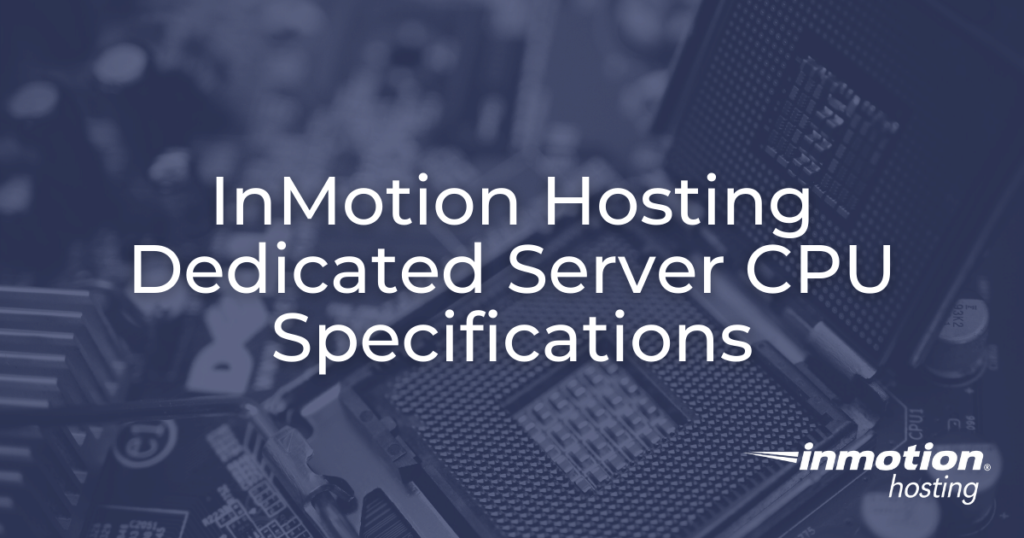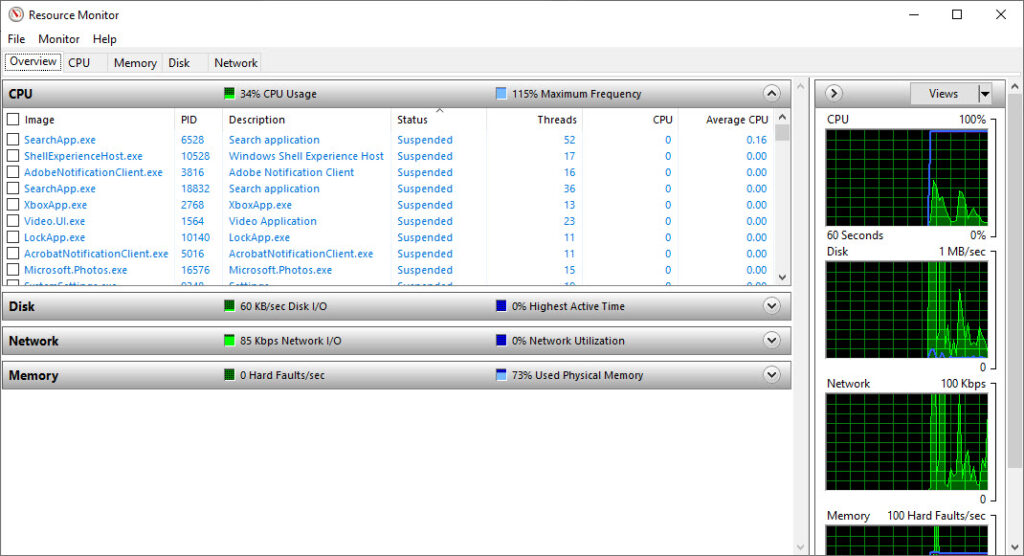
When deciding which web hosting solution is right for you, it can be difficult to parse through the various hardware specifications and understand what they mean for your web hosting experience. This is particularly important when looking to purchase a high-speed, state-of-the-art custom Dedicated Server hosting solution. In this article, we will discuss the central processing unit (CPU) specifications of InMotion Hosting dedicated servers.
Topics Include:
Basic CPU Specifications
CPU Cores
One of the key specifications of a CPU is the number of processing units or cores it possesses. While older CPUs traditionally contained a single core, newer CPUs have multiple cores. Since CPU cores are responsible for reading and executing program instructions, having multiple cores means instructions can be run on different cores simultaneously through a process known as parallel computing. The end result of this is an increase in processing speed that in turn increases the overall speed of the computer system.
Having multiple CPU cores allows for better system multitasking, where different CPU-intensive tasks are handled by separate cores. By spreading out the processing demand of multiple different tasks, the overall burden, or load on the CPU is reduced. While this is useful in the context of personal computing, it is particularly important in the context of web hosting. Thanks to multi-core CPUs, modern web servers can handle a great deal of multitasking without suffering performance degradation.
CPU Threads
While CPUs are commonly divided into physical cores, they are also sometimes further divided into virtual cores, or threads via what is referred to as hyperthreading. These threads exist as virtualized, partitioned processing units that allow further multitasking and parallel computing potential. When discussing CPU specifications, it is important to consider both the number of physical cores as well as the number of threads. Generally speaking, modern CPUs have twice as many threads as physical cores.
InMotion Hosting’s dedicated servers offer a variety of different multi-core CPU options to give you a greater range of customization for your dedicated server while providing state-of-the-art, high-performance processing capabilities.
Advanced CPU Specifications
CPU Clock Speed
In the context of computing, clock speed generally refers to the frequency of a processing unit, usually expressed in hertz (Hz). This value is generally used to indicate the speed of the processing unit, with modern CPUs possessing a clock speed in the gigahertz (GHz) range. This is a vast improvement over early CPUs that possessed clock speeds in the kilohertz (kHz) and megahertz (MHz) ranges.
Since the clock rate is an indicator of the speed of a processing unit, the higher the clock speed, the faster the system can process information. Using a CPU with a high clock speed will ultimately boost the overall speed of your server and allow it to handle higher processing demands.
CPU Cache
A less commonly discussed CPU specification is the CPU cache. The CPU cache is a hardware component located in close proximity to the CPU that acts as a cache for frequently accessed pieces of data. Storing and retrieving data in the CPU cache can be done much more quickly than storing it in the RAM-based cache. Depending on the size of the cache, more or less data can be stored. By storing frequently accessed data in the faster memory of the CPU cache, the speed of the overall system can be increased.
A larger CPU cache allows the system to store more frequently accessed data, reducing the amount of time it takes to retrieve it when necessary. For larger server operations, the size of the CPU cache can be a vital factor in system performance.
Front-Side Bus and Intel QPI
Another less commonly discussed CPU specification is the front-side bus. The front-side bus is a computer interface, or bus, used in Intel-based chips. The function of the front-side bus is to transport data between the CPU and another component, generally a memory controller hub. The rate of transfer is sometimes expressed in terms of gigatransfers per second (GT/s).
An example of a front-side bus commonly in use today is the Intel QuickPath Interconnect (QPI). One of the key advances of the Intel QPI was an increase in scalability and bandwidth availability. InMotion Hosting dedicated servers utilize Intel QPI to provide high-speed interconnectivity between the CPU and the rest of the system components. With high-speed communication between the CPU and the rest of the server, the system is faster overall and more responsive to inputs.
CPUs and Web Hosting Performance
By familiarizing yourself with the various specifications used to describe modern CPU hardware, you can better decide which solution is right for you. If you are looking to set up a future-proof server with room for growth, a 24-core CPU with a large CPU cache may be perfectly suited to deliver high performance and scalability. For users looking to get started with dedicated server hosting, a 4 core CPU with a smaller CPU cache may be more appropriate. Thanks to multi-core processors and virtualized hyperthreading, even smaller CPUs are still capable of delivering high-speed performance.
It’s All Connected!
Whether you’re using an Intel or AMD CPU, 24-cores, or just 4 cores, the performance of your system is not based on just that factor alone. You will need to consider, memory, network speed, and storage options. Each of these options could become a potential bottleneck in the performance of your system if not carefully matched to your selected CPUs.
Depending on your operating system you will find options to monitor your resources that will help you determine the performance of your current system. It will also help to determine the upgrade (or downgrade) of your dedicated server. Here’s an example of the Windows Resource Monitor:

InMotion Hosting dedicated servers are designed with high-speed web hosting and scalability in mind, with a wide variety of customization and expansion options. Combined with state-of-the-art hardware, IMH dedicated servers have everything you need to get your web server operations up and running in short order.
Scale your business with high-performance dedicated hosting. Choose from Managed Dedicated Servers powered by cPanel, or select a Bare Metal Server for complete server control via the command line.
DDoS Protection
99.99% Uptime
Software RAID
New Customer Discounts
